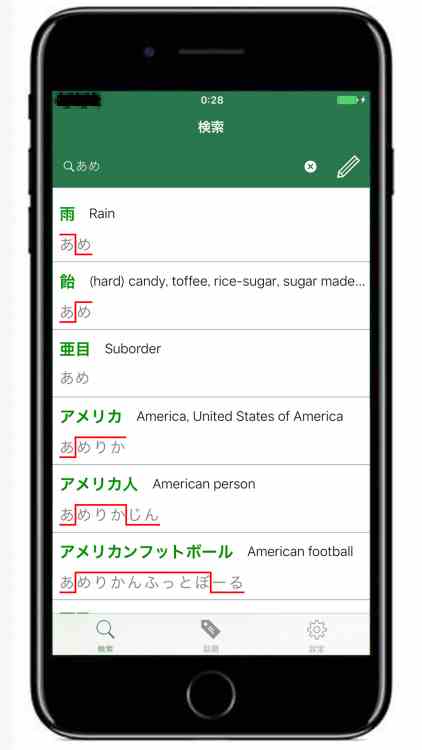Search the Community
Showing results for tags 'pronunciation'.
-
Can you guess answer behind these pictures? 1. 2. 3. . The answers are below. ================================== . . . . . . . . . . . . . . . . . . Hi everyone, today I want to introduce a new mobile game (iOS and Android). I think it is the hardest English word guessing game you have ever played! ----------------------------- Game: Hear the Picture Hear the Picture is an English word guessing game with a new, fun and crazy game rule that can challenge your English ability. Let's see some examples: four + mat = format win + doe = window you + knight = unite ---- You can see, pronounciation in English is used to make game rule. So, the illustration of a picture does not tell the answer, but its combined sound does. ---- HOW TO PLAY ---- In each picture of a level, you have to find out 2 words that the picture illustrated, then combined their sounds and make another difined word in English, almost not related to what the picture illustrated. ----- You will have a tutorial at starting of game. If you get stuck, there are some tools to help you find out the answer. Not easy, but fun! Best to play with your friends and family. There are 100 levels to challenge your intelligent, and will be updated more. ----- Link download in website: www.hearthepicture.net
-
Interested in sounding more Italian? We are testing an online Italian prosody/intonation training. For more info and to sign up, click here. Participation involves three short online sessions one week apart, and participants will be entered into a drawing for a Visa gift card.
- 2 replies
-
- italian
- italian language
- (and 7 more)
-
Hello, I wonder if there are people here who use forvo.com on a regular basis. I have discovered the site about a month ago when I struggled with some words in Italian. I wasn't sure how to pronounce them correctly and had nobody to ask as I'm studying on my own. So finally I googled something like "how to pronounce the word X in Italian" and the site was among top search results. My experience so far has been very good - I find all of the words I need pronounced, and if I don't, I put the word in the waiting list and some native speaker helps you out. However, I wonder just how reliable this is. What's your opinion of forvo? Do you use it for your language learning? Are there any similar sites like that? Ania
-
Better English Issue #1 Wins Kirill participated in, and finished, his first half marathon on September 15, 2019. Kirill is a full time lawyer, father, husband and more! And yet, he managed to squeeze running into his hectic schedule. Read more about the race here. Kirill is pictured above with his family. (You can see the images on your laptop, if not on your phone!) Let me know of recent wins in your life, big or small, that you’re proud of! Write to me here, [email protected] Send pictures! Vocabulary Expansion Did you know that in English we don’t eat coffee? We drink coffee. We have coffee. We imbibe coffee. We sip coffee. But we don’t eat it. Eating involves mastication, involves chewing. What about ice cream? We don’t eat ice cream, either. We don’t chew it. However, we don’t simply swallow ice cream, either, as if it were a liquid! We have ice cream. We don’t eat ice cream. We don’t imbibe ice cream. We don’t sip ice cream. We just have ice cream. That’s it! When speaking of consuming any solid food, semi-solid food, soft food or liquid, the safest, and always correct, verb to use is “to have”. Recently, I had eggs cooked in butter with sliced tomatoes and hot peppers. I also had milk with two tablespoons of Nescafe Clasico stirred in. What did you have recently for one of your meals? Did you see any new vocabulary? Read the above short text on Readlang! To Eat, To Drink, or To Have That is the Question Resources Readlang is a great tool for vocabulary expansion and review. Check out this series of short tutorials and get started! Getting Started with Readlang Video Download Helper is a Firefox extension that allows me to download and save, offline, most of the videos I want to save for further study offline. You;ll know you’re in the right place because of the easily recognizable yellow, red and blue ball logo. Recommended Reading Outliers is a series of true stories and observations. I listened to the audiobook and you can, too. Interview Grant Cardone interviews Joe DeSena. Enjoy the conversation. If desired, adjust the speed to 0.75 by clicking on the settings button on the right side of the video toolbar. Listening Comprehension Challenge Secrets of Success in 8 Words, 3 Minutes What was this person saying and what made understanding them so challenging? What could this person have done to make it easier for his audience to understand him? How can you make your English easier for your audience to understand? Gems from Class interested vs interesting Both interested and interesting are adjectives. interested says something about how the subject feels For example: I am interested in travel. In this sentence, “I” is the subject. This sentence talks about how “I” feel. interesting says something about the power of the subject to make other people feel a certain way. For example: Travel is interesting. In this sentence, “Travel” is the subject. This sentence talks about the fact that “travel” has the power of making people feel a certain way. For more practice and to subconsciously learn the rules, do some online exercises. Here is a link. Repeat the exercise many times until you get 100% correct repeatedly. Pronunciation & Intonation met SOUNDS LIKE set, bet debt, jet, let, net, pet met is the simple past affirmative form of the verb “to meet” meet SOUNDS LIKE meat, seat, neat, feet, feat, Crete meet is one of the simple present affirmative forms of the verb “to meet” the other simple present affirmative form of the verb “to meet” is meets Tip: When reading and writing, use your voice! When you use your voice, you’ll be less likely to write “met” when you mean “meet”. You’ll be less likely to write one word, when you really mean another one. Poll Here is the question: What is your BIGGEST problem with English? The Sharing Economy Enjoying this Better English newsletter? It just takes a moment to share useful and inspiring content with a friend or a business colleague. Do you believe you need better English? We are committed to serving adults who are non-native speakers of English. Those adults--out of necessity--use English at work, and they have an intermediate or advanced level of English. Does this describe you? Do you have have access to 30 minutes per day, technology and the determination to get better at English now? Contact us today. Niamaat aka “Nia” +52 33 2235 2989 [email protected] Get Better English Now Copyright © 2019 Get Better English Now All rights reserved.
-
Anybody have tried these two exercises before? Exercise #1: Mirror Learning Pinyin will help lay the foundation for pronunciation. Chinese Pinyin consists of initial consonants (b, p, m, f, d, t, n, l, g, k, h, j, q, x, z, c, s, r, zh, ch, sh) and finals or compound vowels (a, o, e, i, u etc). How can we make sure that we are pronouncing them accurately? Watch ourself in the mirror! When we try to imitate the pronunciation of the written Pinyin, check our mouth’s appearance, along with our lip and tongue positions as we make the sounds. Here is an example of what to look for in the mirror: For initial consonants: n, m ● When you pronounce the “n” sound, your lip needs to be kept slightly open, exposing your bottom teeth. ● While you pronounce the “m” sound, you need to keep your lips closed. Check your lips in the mirror to make sure your pronunciation is correct. Finals: a, o, e ● When we pronounce the “a” sound, open our mouth wide, put our tongue in a centered position and slightly raise the middle of the tongue blade (just behind the tip). ● When we pronounce the “o” sound, push our lips forward into a small circle, with our tongue at the bottom of our mouth, leaving a hollow space just above it. ● To produce the vowel “e” sound, first pronounce “o”, and then change the shape of our mouth from rounded to unrounded. At the same time, spread our lips apart, as if we were smiling. Maybe we can do this in the privacy of home, so that we don’t have to feel silly in front of others! Exercise #2: Paper Prepare some small and thin papers in a plate, and pronounce “b” and “p” initial consonants toward the plate. Of course, make sure our mouth is close to the plate, as the following image shows. If we pronounce “p” correctly, small papers will be blown away. On the contrary, the papers will be kept stable if we pronounce “b” correctly towards the plate. It’s as simple as that! A good way to imitate and distinguish aspirated consonants and unaspirated consonants is an exercise that I call “paper game”.
-
- chinese learning
- mandarin
-
(and 2 more)
Tagged with:
-
Hey guys, I wanted to share this great directory of free language learning resources. The site is specific to Spanish, but many of the apps and resources are available in all languages. Hope this helps! www.learningspanishforfree.net
-
- translator
- vocabulary
- (and 7 more)
-
Dear ELL Community, I would love to get your feedback about a method I’ve been using to teach English, for which I am creating an online course. My background is in the performing arts and I’ve been teaching English to students of all ages, from all over the world using acting exercises and performance texts. Instead of using textbooks, I use performance scripts, films, Ted Talks and literature that show the rhythm of English speech. Classes begin with a vocal warm-up (which is often silly and makes people laugh!), then vocal pronunciation exercises. After this, we apply pronunciation techniques to a text to create a character and short performance. We use our voice and bodies, and through the process, learn phonetic grammar rules. I’m working on offering my courses online and I would love to know: 1. Is this something you are interested in? 2. Would you like to help me by testing a course and giving feedback? If yes, leave a comment below or go to my website (below) and enter your email. I’m still working on things but once I have the courses ready, I’ll email you to let you know. Thanks so much! https://katecreative.wixsite.com/actforenglish
-
- english language learners
- online language learning
- (and 2 more)
-
Hi everyone,I want to introduce an iOS app which is very useful for learning Japanese, especially Japanese's accent and pronunciation. The app' data is referenced from famous Japanese's websites so that it is completely reliable. Below are the app description and download link, please take a look at this.JAccent is an offline Japanese accent dictionary for Japanese teachers and learners.You can search for the Tokyo dialect accent, and you can also search for kanji's meaning.Also, you can easily find opposite words, Japanese counter suffix, Japanese surname and so on.Absolutely, you can use it daily for checking the meaning of the word.※ Features:・Over 45,500 accents・Over 5000 opposite words・Over 12,000 kanji's meaning, Onyomi, Kunyomi, writing etc.・Adjectives and verbs' forms・Japanese counter suffix, Japanese surname, Japanese place name, overseas place name・Audio listening・Kanji's handwriting recognition・Internet is not necessary (Except audio listening)※ Coming soon features:・Words and Accents' contribution・Accents' quizzes※ App's data referenced the following page: - http://accent.u-biq.org/ - http://www.gavo.t.u-tokyo.ac.jp/ojad/ - http://kanjivg.tagaini.net/ ※ Download link on AppStore: https://itunes.apple.com/jp/app/id1252200087?mt=8
-
- japanese
- dictionary
-
(and 6 more)
Tagged with:
-
As you may have read in my profile, I love to help people to learn and/or improve their Spanish. This is my mother tongue and I teach it for a living...! I have designed and uploaded a Spanish Pronunciation Workshop to Thinkific (a Canadian organization for on-line courses). No bells, no whistles, just good, solid content on what Spanish pronunciation is all about. Excellent for beginners or advanced students. Click on the link and check it out and, por supuesto, let me know what you think: http://gospanishgo.thinkific.com SPECIAL INTRODUCTORY OFFER: The first 50 students to sign up will receive a free one-hour on-line Skype or Zoom session with Cesar T. You will be able to, actually, practice what you have learned or ask questions to a real instructor...! You decide whether you take it before of after you complete the workshop. Just send me a message to schedule a day/time. ¡Muchas gracias!
-
- speak
- pronunciation
-
(and 2 more)
Tagged with:
-
There's a post that speaks about some of the basics of Hebrew, however, there's nothing about pronunciation. I was wondering if anyone on here speaks it. I know very small amount of pronunciation, like how the CH has that very specific sound, but beyond that I'm stumped. Are there any tips you can give someone with near nonexistent exposure to the language? I'm mainly concerned with pronunciation of the words.
-
Greetings, I'm native French speaker and live in France. I enjoy teaching French & learning languages. I fully understand the problems that you may encounter when trying to learn a new language. I look forward to helping you to learn or improve your French both written and spoken on www.alacarteachers.com Do you know you can also be a personal tutor and helping people to become fluent in your native language ? Do not hesitate to susbcribe ( it's free) on www.alacarteachers.com and set up your own sessions. You can earn money while teaching your mother tongue from home ! Kind regards Sarah
-
Greetings: I live in Mexico. Previously I taught English in China for several years and it was necessary to learn their language to adjust my teaching style to their needs. Now, living in Mexico I can see very clearly some of the problems facing Latino students who desire to learn English. I just finished converting my Chinese phonetics program to Spanish to aid hispanohablantes. There are less sounds in Spanish than the target language English, therefore native Spanish Speakers need to be taught these sounds which, from their point of view, are unknown to them...not within their experience. The URL is here. http://www.elaanslist.com/display/fluency.php . It is not an app, but instead it is a screen cast used for self-learning. It requires personal dedication and verbal discipline to complete. It is to be used with your current English lessons.
-
- tuition
- pronunciation
- (and 5 more)
-
The question of language difficulty is a controversial issue. Some people discuss the obstacles on the road to solid linguistic skills. They make hit parade of reasons requiring great efforts. - Tones - Difficult grammar - Widely spread opinion - Difficult writing system - Similarity to native language - Personal opinion - Long years of ineffective studying Moreover, many people claim that their native language is the most difficult to learn. Maybe it is a way to stroke their ego. However, it is possible to overcome all obstacles and difficulties. It is well-known fact that learning of some languages needs more time than other is. The list of most difficult languages 1. Chinese (1.2 billion of native speakers) A tonal language with difficult writing system could be a real challenge. The word’s meaning depends on the intonation of pronunciation. Tone creates different words. It is possible to learn Chinese characters all your life and still not know all aspects. 2. Arabic (221 million of native speakers) There are four forms of writing of letters, which depend on a place in a word. Vowels are often not included in writing. It makes the translation from Arabic difficult. The language sounds unfamiliar for native English speakers. 3. Japanese (122 million of native speakers) This language has three separate writing systems and two alphabets. It is necessary to know thousands of characters. It has borrowed many technical English terms since 1945. The main difficulty of Japanese language is the differences between written and speaking codes. Moreover, the sophisticated system of politeness and formalities gives foreigners hard time. 4. Korean (66.3 million of native) The system of verb conjugation, syntax and grammatical structure makes Korean difficult for learners. Sentence structure seems strange for beginners. When speaker describes the action, he has to use subject first, object and end with the action itself. The adjective is used after noun for describing something. The difficult alphabet is influenced by Chinese. Moreover, this language does not belong to any linguistic family. The vocabulary is unfamiliar for English native speakers. The unique writing system Hangul combines the principles of syllabaries and alphabets. Korean has seven speech levels characterized by verbal endings. They depend on the formality of the situation. 5. Thai (20.4 million of native speakers) This language is a part of Tai-Kadai family. Some words were borrowed from Sanskrit. Spoken and written language belong to different registers. Their using depends on social context. That’s why I want to recommend you very good translation site. They can handle with any difficulties which you can’t do on your own, just get over here. I am sure you won’t be disappointed
- 1 reply
-
- language
- translations
-
(and 1 more)
Tagged with:
-
Syllables and Accent in Latin It seemed to me that I would overwhelm you if I added this in my previous topic with pronunciation, so I decided to give this a special attention, just a little bit about syllables and accents in Latin. Syllables Latin vowels can be both long and short. Latin diphthongs are always long. This helps determine the length of the syllables. Latin syllables can be long: - by nature/naturally if they contain a long vowel or diphthong, e.g. flos (flower) vita (life), Caesar, aurum (gold) - most good dictionaries actually tell you whether the syllable is long or short by nature - by position if they contain a short vowel which is followed by two or more consonants, e.g. arbor, dux (x is actually ks, so that counts as two). It may seem that the length of a syllable is not really important, but it actually is. It can change the meaning of the word, take for example liber - with short i, liber means book and it's a noun; with long i, it means free and is an adjective. Another example could be malum - with short a, it means evil, with long apple. Accent in Latin The first and foremost rule: Latin words are accentuated from the end, not the beginning. The accent can be on the last syllable, the penultimate syllable and the third from the back (which are, actually, in Latin the first, the second and the third). The similar system is in Ancient Greek as well - the syllables are counted from the end of the word to the beginning, and they too can be only on the last three (from our perspective, from their perspective, it's actually the first three). If a word has only two syllables, the accent is on the penultimate one (that is on the ''second'' as would be more proper to say), e.g. vita, pater, mater, terra If a word has three or more syllables, the accent is on the third from the back (or simply, ''third'', if you adopt the Latin way of counting them) if the syllable is short, e.g. Cicero (-ce- is short), populus (both po- and -pu- are short here) and on the penultimate (or the ''second'', really) if the syllable is long, e.g. natura (-tu- is long here). I know that this sounds very abstract and technical, but we have to start from somewhere, don't we? These are the very basic things and they are actually very important. You can't read Latin without them (not properly, at least). But, if it makes it any easier, I didn't like this part of the grammar either.
-
Latin Alphabet, Spelling and Pronunciation The Romans had taken the letters from the Greeks (via the Etruscans). In the beginning, there were only capital letters. In Cicero's time, there were only 21 letters of the alphabet (it ended with X). Y and Z were added later because of the borrowed Greek words such as Byzantium. Capitalisation in Latin: - proper names, their adjectives and adverbs: Latium (the area), Latinus (of Latium, belonging to), Latine (adv.) -first word in a sentence and usually first word in a verse (though in many Latin texts, this isn't observed) Alphabet and Pronunciation For the sake of easier understanding and different phonetic chart, I am going to give examples in English, where possible, and bold the letter pronounced. Only bear in mind that Latin consonants are more frontal than English ones - meaning that English alveolar t and d sound more dental in Latin and so on. A a car B b brother C c key (classical pronunciation) and German Zeit (traditional pronunciation - though only when c is found in combination with e (cena) and i (Cicero), otherwise, it's like in key) D d dark E e let F f foreign G g Greek H h head (again, more frontal than the English guttural h) I i feed K k key L l light (Latin also has the so called dark and clear l) M m mother N n nephew O o lot P p pay Q q key (in combination qu- quote) R r rot (without the English alveolar sound - Latin r is more like Italian) S s soft (classical pronunciation), both soft and zealous (traditional pronunciation) T t toy U u soot V v what (classical pronunciation), vigorous (traditional pronunciation) X x fix Y y lit Z z zealous Latin also has a very developed system of diphthongi, which are as follows: ae fight (classical pronunciation), let (traditional pronunciation - only longer) oe loiter (classical pronunication) red (traditional pronunciation - only longer) au loud ei fate eu let and soot together (sorry, I can't think of an example in English as it doesn't allow this combination, like many other languages) ui Louis (French pronunciation) Another remark: Combinations -ch-, -ph-, -th- were pronounced differently in these two standards. The classical pronunciation would be kh, ph, th, whereas the traditional would be h, f, t e.g. pulcher is pulkher (or trad. pulher), schola is skhola (or trad. shola), theatrum is theatrum (trad. teatrum) I know that at this point, it must sound obscure, but I wrote this hoping that eve nthose who don't know how to read Latin words can start somewhere. Those of you who speak Slavic languages will find this very easy as Slavic pronunciation of vowels and consonants is very similar to that in Latin. For the rest, try to think about either Russian or German consonants and Spanish vowels. It's best to choose one pronunciation. Traditional is used seldom. Still, I wished to tell you that there were more ways of reading Latin. Most countries have adopted the classical pronunciation, so that is what I would advise you to do. Here are some Latin words for you to practice pronunciation with using the ''chart'' above (I have used only nouns): mater, pater, frater, terra (land), stella (star), populus (people), liber (book), labor (work), acus (needle), bellum (war), ars (art), domus (home), Roma, Athenae








